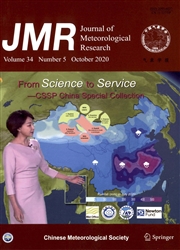Effects of Microphysical Latent Heating on the Rapid Intensification of Typhoon Hato(2017)
作者:Dajun ZHAO,Yubin YU,Jinfang YIN,Hongxiong XU
摘要:A 72-h cloud-resolving numerical simulation of Typhoon Hato(2017)is performed by using the Weather Research and Forecasting(WRF)model with the Advanced Research WRF(ARW)core(V3.8.1)on a horizontal resolution of2 km.To enhance the background tropical cyclone structure and intensity,a vortex dynamic initialization scheme with a terrain-filtering algorithm is utilized.The model reproduces reasonably well the track,structure,and intensity change of Typhoon Hato.More specifically,the change trend of simulated maximum wind speed is consistent with that of best-track analysis,and the simulated maximum wind of 49 ms^-1 is close to that(52 ms^-1)of the best-track analysis,indicating that the model has successfully captured the rapid intensification(RI)of Typhoon Hato(2017).Analyses of the model outputs reveal that the total microphysical latent heating of the inner-core region associated with enhanced vertical upward motion reaches its maximum at 9-km height in the upper troposphere during the RI stage.The dominant microphysical processes with positive latent heat contributions(i.e.,heating effect)are water vapor condensation into cloud water(67.6%),depositional growth of ice(12.9%),and generation(nucleation)of ice from vapor(7.9%).Those with negative latent heat contributions(cooling effect)are evaporation of rain(47.6%),melting of snow(27.7%),and melting of graupel(9.8%).Sensitivity experiments further show that the intensification speed and peak intensity of this typhoon are highly correlated to the dominant heating effect.A significant increase in graupel over 5-10-km height and snow at 10-14-km height in the inner-core region of Typhoon Hato corresponds well with its RI stage,and the latent heating from nucleation and depositional growth is crucial to the RI of simulated Hato.
发文机构:State Key Laboratory of Severe Weather University of Chinese Academy of Sciences China Meteorological Administration
关键词:microphysicalLATENTHEATINGRAPIDINTENSIFICATIONTYPHOONBUDGETanalysis
分类号: TQ5[化学工程]
- Major Scientific Achievements of the First China–Japan Cooperative GAME/HUBEX Experiment: A Historical Review
- Identifying and Quantifying Pixel-Level Uncertainty among Major Satellite Derived Global Land Cover Products
- A Multivariable Approach for Estimating Soil Moisture from Microwave Radiation Imager(MWRI)
- Spatial Distribution and Temporal Trend Characteristics of Agro-Climatic Resources and Extreme Climate Events during the Soybean Growing Season in Northeast China from 1981 to 2017
- Bias Analysis and Correction of Ground Surface Temperature Observations across China
- Research Progress on Estimation of the Atmospheric Boundary Layer Height
- Joint Effect of East Asia-Pacific and Eurasian Teleconnections on the Summer Precipitation in North Asia
- Increasing Trend of Summertime Synoptic Wave Train Activity over the Western North Pacific since 1950
- Spatiotemporal Drought Assessment over Sahelian Countries from 1985 to 2015
- Climate Sensitivity and Feedbacks of BCC-CSM to Idealized CO2 Forcing from CMIP5 to CMIP6


